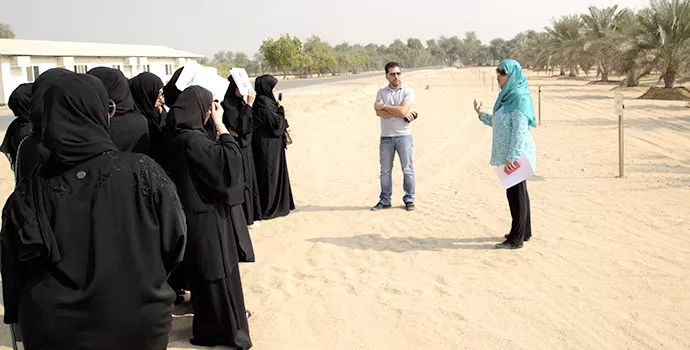Young Emirati women students keen to contribute to UAE’s agricultural sector
20 November 2016
A group of 20 women students from the Department of Aridland Agriculture of the United Arab Emirates University (UAEU) in Al Ain visited the International Center for Biosaline Agriculture (ICBA) on November 20, 2016 to explore and learn various research and innovation activities.
Students, who were interested to learn more about ICBA and its various research and development efforts, were briefed about various research activities like experimental fields of different date palm varieties, evaluated under various salinity levels; evaluation plots of salt-tolerant perennial plants under different salinity and irrigation levels; irrigation techniques and methods like bubblers, drip; irrigation and environmental systems like Supervisory Control and Data Acquisition (SCADA) System; agroforestry trials; integrated aqua-agriculture system, and the Cocoon planting technology.
“It appears difficult sometimes for many Emirati women to learn agricultural science as they think you have to go out in the fields, which is often tiring, especially in the UAE climate. But, there are many opportunities to work, which are not just limited to agricultural fields. Once they take some specialty like I choose horticulture, I’m sure they will find it interesting ― there are a huge scope of learning and ample opportunities available as most of our government approaches are now focused towards green, sustainable and environmental friendly projects,” said Mrs. Alyazia Al-Shamsi, a young Emirati woman, who is about to complete her bachelor’s degree in horticulture.
“Apart from contributing to the country’s research and development sector which needs a big push, we can also implement our scientific knowledge at home. Most of the UAE residents have their own farmhouses, where they keep livestock and grow vegetables and fruits. But many people find it difficult due to lack of knowledge. That is where we can contribute and guide them with best farming techniques.”
ICBA has been at the forefront of encouraging scientific training programs and mentoring future women leaders. Under the Young Arab Women Scientists Leadership (Tamkeen) Program, which is the first of its kind in the Middle East and North Africa (MENA) region, ICBA aims to help women to realize their full potential in science and farming. Supported by the Islamic Development Bank (IsDB) and the Bill and Melinda Gates Foundation, the program provides leadership opportunities, peer and mentor relationships, and contribute to the long-term goal of increasing women-led research into improved food security.
Dr. Henda Al-Mahmoudi, Biotechnologist, ICBA, who presented an overview about ICBA and demonstrated various research activities to students, said: “Youth are the future of science and technology, and we need more young minds, especially women to contribute to science and technology, and have equal opportunities. Under the Tamkeen program at ICBA, we encourage women, especially young Arab women to take leadership roles in science and technology. Programs like these are extremely important for encouraging women to take active roles in future scientific developments.”
“For students, it is really important to correlate what they learn in class with what they actually see on ground. It is a great opportunity, especially when you learn practically at international centers like ICBA. UAE has a major problem of water availability, and we need more research and innovations in this area. These visits not only help students to have a broader understanding of various issues in agriculture, but also identify solutions to problems in the best possible way,” said Mr. Roger Francis, Instructor, Landscape and Irrigation Management, UAEU, who accompanied the students’ group.











